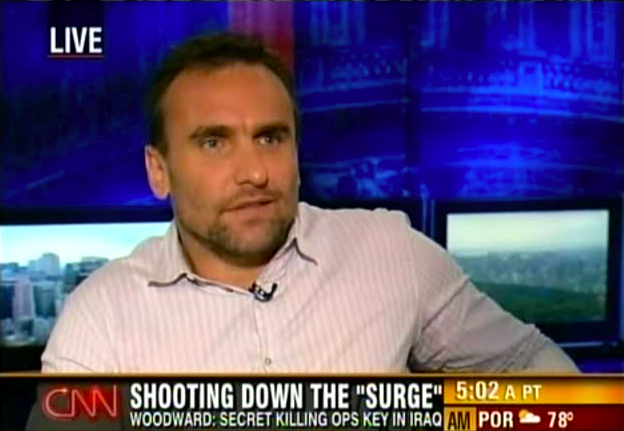AAM: "This is your American militia, the counterbalance to the Iranian militias."

Length: 2:46
LARGE (32.3 MB) ----- SMALL (3.4 MB)
Michael talks to John Roberts about revelations in Bob Woodward's new book.
JOHN ROBERTS: A secret U.S. program to kill terrorists. Washington Post associate editor Bob Woodward says that is the reason violence in Iraq has dropped so dramatically, not because of the so-called troop surge. The claim is in Woodward's new book, "The War Within." Here he is on "LARRY KING LIVE" last night.
(BEGIN VIDEO CLIP)
BOB WOODWARD, AUTHOR, "THE WAR WITHIN": You can somewhat compare it to the Manhattan Project in World War II. If you look at the chart, it's a ski slope right down in a matter of months cutting the violence in half.
(END VIDEO CLIP)
ROBERTS: CNN's Baghdad correspondent Michael Ware has been living the past six years in the middle of that war, and joins us now with his perspective. So what do you think of what he's saying?
MICHAEL WARE, CNN INTERNATIONAL CORRESPONDENT: Well, John, I mean, let's say that these "fusion" teams as they're called have come into effect. The first thing to say is, well, about time.
I mean, on the ground you've seen the lack of coordination, as the left hand of one agency has not worked with the right hand of another agency within the American effort. But by and large to suggest that anything like this being done now has been the major reason for the decline in violence is a bit rich.
I mean, the U.S. subcontracted out an assassination program against al Qaeda way back in early 2006. And this was conceded by the then chief of military intelligence in Baghdad and by Ambassador Zalmay Khalilzad himself. That's what broke the back of al Qaeda.
Then, when America put 100,000-plus insurgents on the U.S. government payroll, including members of al Qaeda, that not only took them out of the field, but it also let them run their own assassination programs against the Iranian-backed militias.
ROBERTS: So it sounds like assassination was the real part of the program here. But was that the only thing that worked? What about the addition of these troops, these neighborhood stations that were set up -- did it all kind of work together?
WARE: Yeah, it does work together. But, I mean, the key to the downturn in violence that we're seeing now is not so much the surge of 30,000 troops in itself. What it's been is the segregation of Baghdad into these enclaves. It's been cutting a deal with Muqtada al Sadr, the leader of the Iranian-back militias, and primarily it's been putting your enemy on your payroll: the Sunni insurgents and many members of al Qaeda, that's what's brought down the violence. And this is your American militia, the counterbalance to the Iranian militias. So if there's new teams are out there with new technology, great, but they're riding the wave of previous success.
ROBERTS: Interesting. Michael Ware, thanks so much for that. Appreciate the inside perspective.
